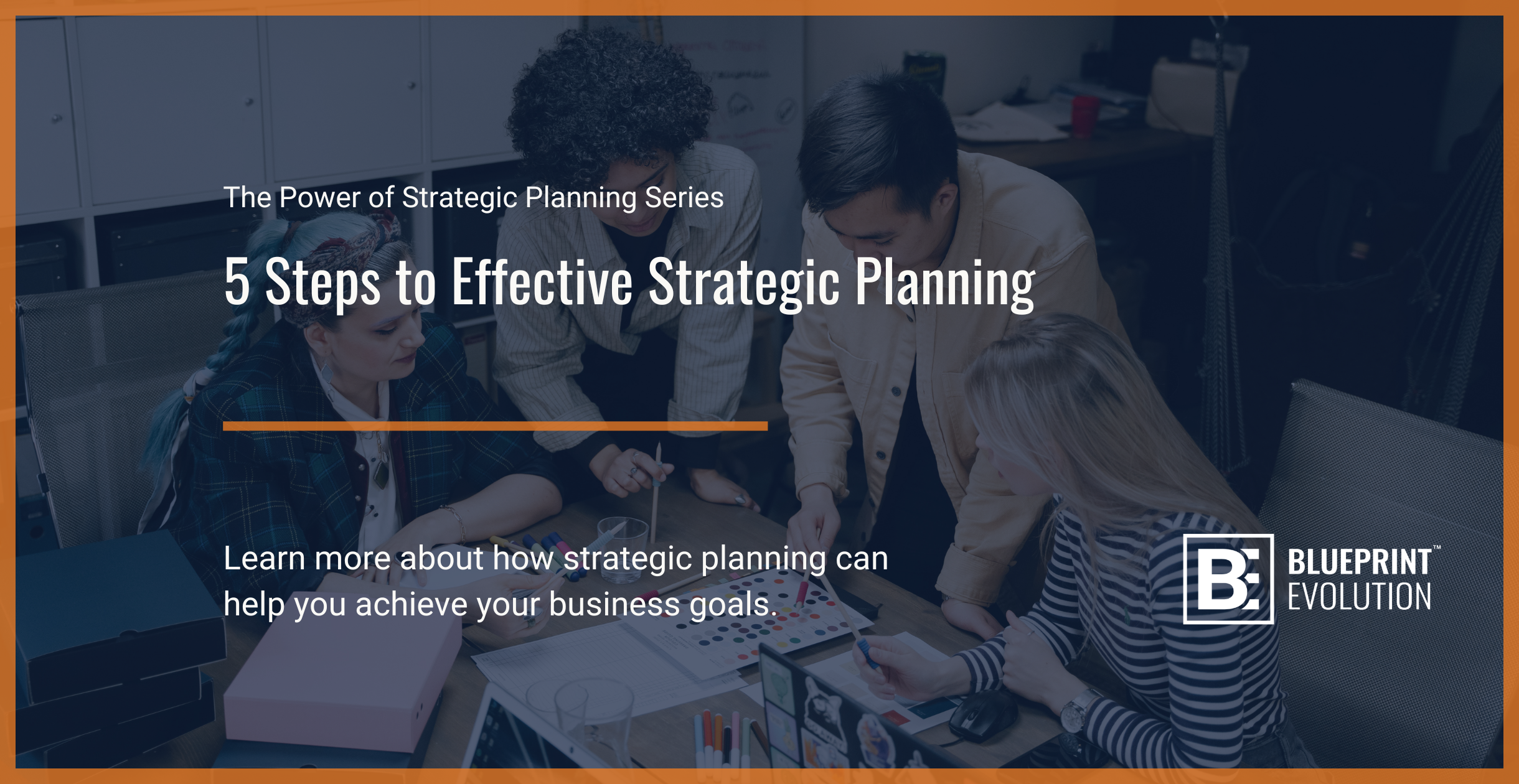Strategic planning is a critical process that enables organizations to define their direction and make informed decisions to achieve long-term success. At its core, strategic planning involves setting clear objectives, analyzing internal and external environments, and formulating actionable plans to achieve desired outcomes. Whether you are a startup aiming to disrupt an industry or an established organization seeking to stay competitive, strategic planning is the cornerstone of sustainable growth.
Blueprint Evolution’s 5 Steps Guide to Effective Strategic Planning
Step 1: Define Your Mission and Vision
The first step in effective strategic planning is clearly defining your organization’s mission and vision. The mission statement articulates the organization’s purpose, while the vision statement outlines its aspirations for the future. These foundational elements provide a sense of direction and help align all stakeholders.
Step 2: Conduct an Environmental Analysis
A thorough analysis of internal and external factors is crucial. This includes a SWOT analysis to identify strengths, weaknesses, opportunities, and threats. Understanding these factors enables organizations to leverage their strengths, address weaknesses, seize opportunities, and mitigate risks.
Step 3: Set Strategic Goals and Objectives
After gaining a clear understanding of the organization’s current state, the next step is to establish strategic goals and objectives that define its desired future state. These should be specific, measurable, achievable, relevant, and time-bound (SMART). Establishing clear goals ensures everyone knows what success looks like and can work toward it collectively.
Step 4: Develop and Implement Strategies
Once goals are set, organizations must develop actionable strategies to achieve them. This includes identifying key initiatives, allocating sustainable resources, and assigning responsibilities. The implementation phase requires detailed planning, clear communication, and robust project management to ensure success.
Step 5: Monitor Progress and Adjust
Strategic planning is not a one-time activity. Continuous monitoring and evaluation are essential to track progress, measure success, and adapt to changing circumstances. Using key performance indicators (KPIs) and regular review meetings, organizations can stay on track and make necessary adjustments.
How Strategic Planning Drives Organizational Success
Organizations that embrace strategic planning are better equipped to navigate uncertainty and capitalize on opportunities. Here’s how:
- Clarity and Focus: Strategic planning empowers organizations to clearly define their priorities and allocate resources effectively, ensuring efforts are concentrated on initiatives that deliver the highest impact and value.
- Alignment: By aligning objectives across departments and teams, strategic planning fosters collaboration and ensures that everyone is working toward shared goals.
- Adaptability: Regularly reviewing and adjusting strategies allows organizations to stay agile, effectively responding to shifting market conditions and emerging trends.
- Informed Decision-Making: Strategic planning establishes a framework for evaluating options, enabling data-driven and well-informed decisions.
- Enhanced Performance: Setting measurable objectives and monitoring progress helps organizations identify areas for growth, drive continuous improvement, and celebrate achievements.
The Role of a Consultant in Strategic Planning
While strategic planning is essential, it can be a complex and time-consuming process. It also demands specialized expertise and a well-informed, structured process. This is where a consultant can add immense value. Here’s how a consultant can help:
- Objective Perspective: Consultants can bring an unbiased viewpoint, helping organizations identify blind spots and challenge assumptions.
- Expertise: With experience across various industries, consultants offer proven methodologies and best practices to guide the planning process.
- Facilitation: Consultants ensure that all stakeholders are engaged, fostering collaboration and minimizing conflicts.
- Customized Solutions: A consultant tailors the strategic plan to the unique needs and goals of the organization, ensuring relevance and practicality.
- Implementation Support: Beyond planning, consultants assist in translating strategies into action, providing tools, training, and guidance to ensure success.
Strategic planning is more than just a tool or a generalized approach—it is a mindset that empowers organizations to envision their future and take intentional steps to achieve it. By defining clear objectives, aligning resources, and fostering adaptability, strategic planning positions organizations for long-term success. Partnering with a consultant can further enhance this process, providing the expertise and perspective needed to navigate complexities and turn vision into reality. Whether you are seeking to overcome challenges, seize opportunities, or drive innovation, strategic planning is your roadmap to success.
For organizations looking to enhance their strategic planning efforts, consultants offer invaluable expertise and support, transforming ideas into actionable strategies. Whether launching a new initiative, entering a new market, or addressing internal inefficiencies, strategic planning is the roadmap that turns vision into reality. Start planning strategically today to achieve more tremendous success tomorrow. To learn more about our strategic planning resources and solutions, click here.







